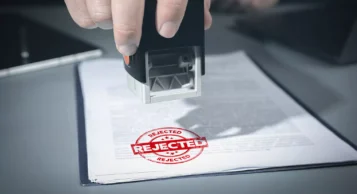
How Your Work History Report Can Sink Your Social Security Disability Claim if You’re Not Careful
You could lose your claim for Social Security Disability (SSD) benefits if you don’t thoroughly and accurately complete one of their most important forms—the Work History Report (Form SSA-3369).
Disability benefits are a financial lifeline
When health problems force you out of your livelihood. They can provide a more stable future. Missing this chance because of one form is a nightmare scenario.
It can happen because of the way Social Security looks closely at the demands of your job and how those demands intersect with your medical conditions. You must be unable to work to qualify for disability benefits.
If you don’t make your job duties clear on your Work History Report, it can sink your disability application. Keep reading for an example of what to avoid.
Disability Benefits and Your Job: An Example
Let’s say a 57-year-old worked as an industrial cleaner. Social Security generally thinks of that role as an unskilled job with a medium level of difficulty (a job requiring lifting up to 50 pounds).
Now the worker’s back pain is making it impossible for them to continue on the job, and they need the monthly income that comes with Social Security Disability benefits.
How does Social Security evaluate this person’s situation to decide if they should get benefits?
The position of industrial cleaner often requires using extremely heavy cleaning machinery and hand trucks. A person moving 200 pounds of material on a hand truck may not be dead lifting 50 pounds, but this is still work far more strenuous than what Social Security considers “light duty.”
In a previous post, I discussed Social Security’s “grid” rules, which factor in your health, age and work background to decide who qualifies for benefits. A 57-year-old who can only perform light duty work and is incapable of performing their past work may be found to have a qualifying disability and be approved for benefits.
The worker also must show that they lack transferable skills to a position which requires less exertion.
In the case of our worker with back problems, the position of industrial cleaner has no transferable skills because it’s an unskilled job. Therefore, this person should be found to be eligible for disability benefits.
But there is one possible hitch to worry about: They filled out their form and described their job duties. But the way they explained their work comes across as—easier.
Social Security Disability, Work History and Getting Denied
Social Security will classify your past work based on the least strenuous of two job descriptions:
1) The way your past work is generally performed in the national economy
2) The way you performed your past work .
Therefore, even though the position of industrial cleaner is generally seen in the national workforce as a medium level job, if you make your own experience sound like a light duty job on your Work History Report (Form SSA-3369), you run the risk of Social Security determining that your past work was less demanding than the national norm.
And if they’ve decided that your health impairments, such as back conditions in the case of our example, still allow you to do light duty work, the description you gave of your duties suggests to Social Security that . . . you could keep doing your job!
Your disability benefits will be denied.
You will have an opportunity to correct this issue with your Work History Report when you go to a hearing with a Social Security administrative law judge to appeal your benefits denial.
But at the time of the hearing, you run the risk that the judge won’t believe what you say now and find that what you wrote in your Work History Report was the more accurate description of how you were performing your position.
So it is imperative that you thoroughly complete your Work History Report, and do it carefully. Don’t skimp on details about every demand that your job placed on you.
Of course, you always should present yourself in an accurate and honest manner when communicating with Social Security. Don’t exaggerate the demands of your job, either.
There certainly are workers who have performed their jobs at an exertional level below what is normally performed in those positions nationwide.
If that is the case for you, so be it. We’ll deal with that issue when you prepare for your hearing.
But if you get your description of your job right in the first place, you can avoid confusing the situation, and possibly win benefits more easily.
One of the best ways to avoid unnecessary problems with your disability claim is to work with an experienced disability lawyer. As a disability lawyer, I’ve helped thousands of Wisconsinites through this process.
We can guide you on how best to answer the questions on the Work History report, so the information you give is correct and supports your arguments for why you should be awarded benefits.
Sometimes your disability attorney can ask you questions about your job that you didn’t think about, and gather details that you didn’t realize were useful for your claim.
Then you may be able to get the benefits that let you rest a little easier.
If you need help with the Work History Report or any other part of your Social Security Disability claim in Appleton, Green Bay and across the Fox Valley and Northeast Wisconsin, talk to us at Geary Disability Law.
Written by Tim Geary.
Disclaimer: Blog entries are not intended to be a substitute for actual legal advice. It is important for a representative to understand the specific facts and circumstances of your case before they can provide you actual legal advice. If you have questions about your Social Security Disability benefits, please contact a qualified representative to discuss your case.
Related Posts

Social Security Disability Hearing Office Closes in Northeast Wisconsin
Early in 2025, Social Security decided to close the disability benefits hearing office in Oshkosh....
Read more
Signs You Will Be Approved for Disability in WI: Do You Have a Strong Case?
When you’re hurt or sick, can’t work and need financial help, you’re on an emotional roller...
Read more
Can I Reopen a Past Social Security Disability Denial in Wisconsin?
People get denied for Security Disability benefits all the time. And very often, they just drop it....
Read more



